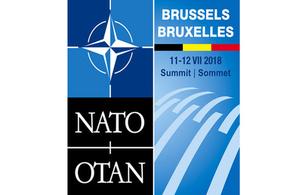NATO’s Brussels Summit and the Arctic

See The Simons Foundation's Arctic Security Briefing Papers for information on military policies and practices in the Arctic region by Ernie Regehr O.C., Senior Fellow in Arctic Security and Defence at The Simons Foundation.
NATO’s Brussels Summit and the Arctic
The run-up to this month’s NATO summit featured an array of pundits, experts and, notably, Canadian Parliamentarians, encouraging the Alliance to step up its presence and collective operations in the Arctic. As it turned out, NATO leaders wisely resisted the entreaties. The Brussels Summit Declaration is silent on the Arctic, and NATO officials, when asked about it, were just as inclined to talk about Arctic cooperation as they were about military expansion and Russian or Chinese threats in the high north.
The two-pronged appeals ahead of the Brussels meeting – to heed the ongoing build-up of Russian military capacity in the Arctic, and to call for a more overt collective response by NATO – were typified by the Wall Street Journal’s insistence that the US and NATO should “adopt a new strategy” in response to the “massive Russian military buildup” in the High North. Just days before the summit, the UK’s Chatham House, the Royal Institute of International Affairs, called on NATO to develop a “coherent vision for how to protect NATO interests in the Arctic.” Earlier, a RealClear Defense analysis, one among many similar media commentaries, also insisted that the US and NATO needed an Arctic strategy to counter Russia’s decade-long campaign “to assert and even expand its claims to the Arctic.” A CBC analysis went further to warn that “Russian advances in the Arctic are leaving NATO behind,” and that “the Russian bear has pursued a steady march forward much closer to Canada in the Arctic.”
A June 2018 report from the House of Commons Standing Committee on National Defence (NDDN), adopts a similar posture to recommend that “the Government of Canada take a leading role within NATO to specialize in Arctic defence and security doctrine and capabilities, and enhance NATO’s situational awareness in the Arctic, including joint training and military exercises for NATO members in the Canadian Arctic” (Recommendation 19).
It was a surprising appeal from Canadian Parliamentarians inasmuch as Canada’s traditional posture has been one of firm opposition to collective NATO involvement in the Arctic. The Government of Stephen Harper was pointed in its insistence that NATO had no role in the Arctic, and also in its warnings that continued calls for a NATO role would only heighten east-west tensions. A 2017 statement by the Government of Justin Trudeau on Arctic foreign policy also implicitly rejects NATO involvement:
“The increasing accessibility of the Arctic has led to a widespread perception that the region could become a source of conflict. This has led to heightened interest in the Arctic in a number of international organizations including NATO and the Organization for Security and Co-operation in Europe. Canada does not anticipate any military challenges in the Arctic and believes that the region is well managed through existing institutions, particularly the Arctic Council. We will continue to monitor discussion of Arctic issues in other international forums and intervene when necessary to protect Canada’s interests” (emphasis added).
Washington has certainly not proposed any significant role for NATO in the Arctic, seeing NORAD and its own Northern Command (USNORTHCOM) as the focus of defence efforts in the western Arctic. As the Canadian academic and Arctic specialist Michael Byers told the Committee:
“[I]t’s important to underline that there are in fact, from a security organizational perspective, two Arctics. There is the European Arctic, which the Americans regard as part of the U.S. European Command, which is very much a NATO co-operative exercise. There is the North American Arctic, which from an American perspective is NORTHCOM, and from a Canadian perspective a NORAD mission, not a NATO mission.” (p. 78).
The NDDN report nevertheless points to the Trudeau Government’s defence policy paper – Strong, Secure, Engaged – and its reference to enhancing military operational capabilities in the North, including the capacity to conduct “joint exercises with Arctic allies and partners” and strengthening “situational awareness and information sharing in the Arctic, including with NATO” (p. 77), finding in that a basis for promoting a collective NATO presence in the Arctic. The report notes that “a number of witnesses welcomed the involvement of NATO in the security and defence of Canada’s Arctic,” and that, as the region becomes more accessible, and as “Russia builds its military capabilities and China increases its presence in the Arctic,” Canada should look to NATO for help in Arctic protection (p. 77). One witness, in a curious take on Alliance solidarity, even “urged Canada to convince NATO to spend more time worrying about Canada’s north as opposed to Norway’s north” (p. 77). Testimony at the Committee included calls for Canada to conduct training exercises with NATO in the Arctic, establish a NATO centre of excellence on Arctic Security in Canada, and play a leadership role in any NATO northern or Arctic command (p. 78). Continue reading...
Ernie Regehr, O.C. is Senior Fellow in Arctic Security and Defence at The Simons Foundation, and Research Fellow at the Centre for Peace Advancement, Conrad Grebel University College, University of Waterloo.